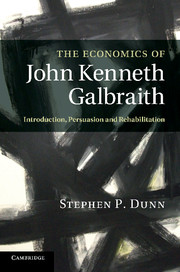Book contents
- Frontmatter
- Contents
- List of figures
- List of tables
- Foreword
- Preface
- Acknowledgments
- 1 The eclipse of The New Industrial State?
- 2 A life in our times
- 3 The economics of John Kenneth Galbraith
- 4 The methodology of John Kenneth Galbraith
- 5 The general theory of advanced development
- 6 Why people are poor
- 7 Uncertainty and the modern corporation
- 8 A theory of the multinational corporation
- 9 The management of specific demand
- 10 Money and the real world
- 11 A man for our times
- 12 The origins of the Galbraithian system: talking to John Kenneth Galbraith
- References
- Additional works by Galbraith
- Index
3 - The economics of John Kenneth Galbraith
Published online by Cambridge University Press: 10 January 2011
- Frontmatter
- Contents
- List of figures
- List of tables
- Foreword
- Preface
- Acknowledgments
- 1 The eclipse of The New Industrial State?
- 2 A life in our times
- 3 The economics of John Kenneth Galbraith
- 4 The methodology of John Kenneth Galbraith
- 5 The general theory of advanced development
- 6 Why people are poor
- 7 Uncertainty and the modern corporation
- 8 A theory of the multinational corporation
- 9 The management of specific demand
- 10 Money and the real world
- 11 A man for our times
- 12 The origins of the Galbraithian system: talking to John Kenneth Galbraith
- References
- Additional works by Galbraith
- Index
Summary
The ideas of economists and political philosophers, both when they are right and when they are wrong, are more powerful than is commonly understood. Indeed the world is ruled by little else. Practical men, who believe themselves to be quite exempt from any intellectual influences, are usually the slaves of some defunct economist. Madmen in authority, who hear voices in the air, are distilling their frenzy from some academic scribbler of a few years back. I am sure that the power of vested interests is vastly exaggerated compared with the gradual encroachment of ideas.
J. M. Keynes (1936: 383)Galbraith's work on the modern corporation, and public policy toward it, has been scantily explored in the journals – except for scraps of disavowal on the basis of competitive postulates.
Paul Davidson and Sidney Weintraub (1978: 5)The economic contributions of John Kenneth Galbraith can be viewed both negatively and positively. On the negative side Galbraith was highly critical of traditional approaches to understanding the way the economy works and the concomitant economic policies that are pursued. He criticized economic theory for ignoring and obscuring the economic power accumulated by large corporations. He has criticized politicians who aligned themselves with the objectives of the large corporation instead of acting in the public interest. And, like Paul Krugman (1998) more recently, he censured those economists who perform sophisticated mathematical analysis but who do not seek to promote deeper understanding of the real world.
- Type
- Chapter
- Information
- The Economics of John Kenneth GalbraithIntroduction, Persuasion, and Rehabilitation, pp. 44 - 73Publisher: Cambridge University PressPrint publication year: 2010



